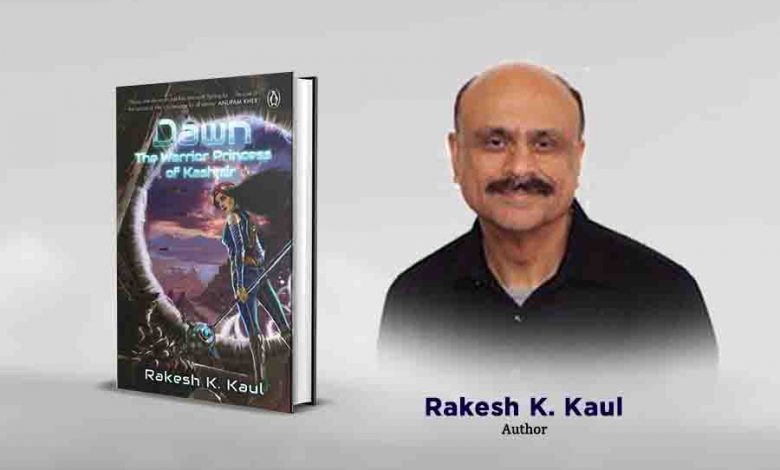‘Dawn- The Warrior Princess of Kashmir’- A tribute to the warrior princesses

Wednesday, 17 November 2021 | PNS
Rakesh K. Kaul is a famous author who hails from Kashmir and moved to the United States in 1972. Rakesh was a founding contributor to the first chair of India Studies at University of California, Berkeley. Kaul is widely known for his bestselling, historical drama The Last Queen of Kashmir and his last released book was Dawn: The Warrior Princess of Kashmir. Here are the excerpts of his interview.
What is your journey of writing ?
It is a quest. Where my hero’s odyssey presents him or her with challenges that are existential threats to their physical or mental well being. My warrior learns, adapts, and transforms so as to face his or her enemies. When successful, the questor hero becomes the new storyteller and the creator of a new world. My story is grounded in the force of life that invariably defeats death but it is bigger than life. The story is not just about the momentary thrill or escape but an expansion of the self. You, the reader, should experience growth in your universe of knowledge and potency of action. You should gain degrees of freedom that you didn’t know existed. My story should entertain and empower you in all of its twists and turns.
What inspired you to write this book?
I had gone for a visit to mystic Mount Kailash in Tibet. There is an ancient story in Kashmir that Shiva’s cave is the entry to a passageway that leads from India to China. All the historical monks residing in the Kailash caves are male. I wondered what it would be like if in the future there was a young girl who took up her residence there? Why would she end up there? What would be the purpose of that cave in the year 3000 A. D.? Would it still hold power over humans in a world where the technology would be mind boggling? The story begins in Mount Kailash and in some ways it ends there. In the telling I wanted to fill the reader with wonder and amazement. And voila thus was born the first bonafide science fiction story out of India based on Indian literary principles. So, if you like “1984” or “Brave New World,” which are sci fi classics, then “Dawn” is going to take you to a whole new level. Even more than Joseph Campbell, the stories that I have brought to the reader are not mere myths or fantasies; they reveal a cognitive organ and knowledge acquisition capability which unlocks the deterministic laws of nature in a manner that science is just beginning to grapple with.
What is the significance behind the title of your book ‘Dawn- The Warrior Princess of Kashmir ‘?
“Dawn” in Sanskrit is “usha.” Usha is the most important goddess in the Rig Veda, the oldest extant text in the world. By contrast, none of the goddesses that we think about today are even mentioned there. Dawn is the harbinger of the rebirth of life each morn. She is the only Indian goddess who has spread around the world. Usha’s cognates are Eos in Greek, Aurora in Roman and Eostre in Anglo-Saxon [mythology], which is the root of the word Easter —the festival of resurrection. Interestingly, Usha is also the name of the sanctuary city where the Sanhedrin, [Israel’s] rabbinical court, fled to in the 2nd century. She is also the goddess of order, the driver away of chaos and darkness. She is dawn, she is hope, she is the wonder leading to resurrection.
Humans recognized her wonder a long time ago. They imagined Dawn born at the birth of the universe, whose one-pointed mission is to make darkness retreat and drive ahead fearlessly. Kalidasa wrote a beautiful poem on her which will give the reader goosebumps. But Dawn is also a tribute to the warrior princesses of Kashmir, a land which was celebrated for its women in practice and not just poetry. They were not merely martial warriors, nor just holy warriors or ninja warriors, but much more. The Kashmiris enshrined the dawn mantra within themselves, men and women, and repeat it to this day. In my novels, the protagonists repeatedly draw upon it.
Which part or incident in your book do you feel that your readers might be able to relate to the most?
Most everyone loves to dance to music. If one sees social media today one of the most popular creative themes involves dancing. There is every permutation and combination of body movement to be seen which fills one with delight. There is an episode in the book where everyone including Dawn gets drawn into a dance sequence with Ganesha. It is totally wild and its conclusions are quite revealing. The startling lesson that Dawn learns in the Ganesha dance is weaponized by her in the grand finale scene. It will get the reader moving.
What is the one thing that you learned or inspired you while you were writing your books ?
I was inspired to bring back “Niti” to the world. Niti means “the wise conduct of life.” The first collection of Niti stories from Kashmir is the 2,000-year-old celebrated Panchatantra, which is the most translated collection of stories from India. Kashmiri stories have found their way into the Aesop and Grimm fairy tales, Chaucer and Fontaine. The Kashmiris maintained that one is born with only one birthright, namely the freedom to achieve what is one’s life quest.
So, the existential question is, What is the “way of life” by which one can maximize one’s human potential? The Kashmiris defined life’s end goal in heroic terms as unbounded fulfillment while alive, not limited by the physical and encompassing the metaphysical. But how does a mere Niti story enable you to achieve fulfillment and consciousness? Niti’s cultural promise is that it enables one to face any threat, any challenge in reaching one’s goal as one travels through time and space. How does Niti work? Let us start with the Western perspective first. Descartes famously said that wonder was the first passion of the soul.
Kashmir spent a thousand years studying this phenomenon and helps us penetrate deeper here. When we have an experience that is a total surprise, we go WOW — an acronym for “wonder of wonder.” When we go wow, it is expressing, How can this be? We not only accept the limited capacity of our senses and the mind, but we also have a profound moment of self-recognition that there is an unlimited capacity in us to experience what lies beyond our knowledge. The wormhole between the two brings the relish of the state of wonder which in India was described as “adbhuta rasa” in the text “Natyashastra,” written by another Kashmiri illuminati, “adbhuta” meaning “wonder” and “rasa” meaning “juice.” So, in the wow moment you momentarily taste the wonder juice. All Niti stories are written in the adbhuta rasa literary style, and so is Dawn.
Is there any new book you are working on ? Please tell us a little about that.
Ha, ha. Authors are very superstitious about not disclosing their works in progress until they are born. Suffice to say that my first novel was set in the past in the 14th century. It was the story of The Last Queen of Kashmir Kota Rani which became a bestseller. My second novel Dawn the Warrior Princess of Kashmir was set in the future in the year 3000 A. D. Now, I am hoping to create a contemporary thriller. That will complete the trilogy. Until then, enjoy reading the stories of Kota Rani and Dawn.
What is your message to budding writers ?
Our civilization maintains that the first power of Consciousness is Speech. So, everyone is a born writer. What is very important is to develop your sense of self awareness. Everything out there is inside you. Your writing is you. A subject which is you becomes an object, your story. If you want the creative force within you to flower then it is key that you experience freedom. The more free you are the more your budding creativity will bloom. Then step back and watch Shakti take over.






